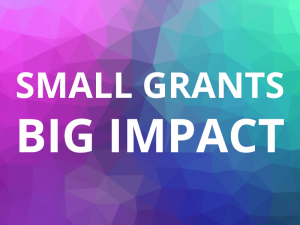About the Mini-grants
Background and rationale
There is a broad consensus that an evidence-informed development agenda is essential for achieving long-term, inclusive development growth in Africa. This is reflected in both Agenda 2063 and the Science, Technology and Innovation Strategy for Africa (STISA) 2024. These frameworks call on African countries to significantly increase their investment in research and development (R&D) by attaining at least 1% of their gross domestic product (GDP). This investment is crucial for building Africa’s technical expertise, improving research infrastructure, fostering innovation and entrepreneurship, and creating a policy environment that propels “Africa’s transition to an innovation-led and evidence-informed knowledge-based economy”.
Furthermore, a critical need exists for both evidence-based policymaking and the effective sharing of this evidence across diverse African contexts, overcoming the bilingual divide that can be a barrier. In response to this, recent decades have witnessed a surge in research and policy activities across various sectors, particularly in health, energy, agriculture, science and technology, and more recently, climate change. However, research efforts on the continent remain fragmented, with limited capacity retention, opportunities for in-continent learning, and inadequate networking among researchers, policymakers, and practitioners. Additionally, challenges persist in publishing research and developing strong scientific leadership, as evidenced by the limited number of African-led research outputs. Compounding these issues is that most African researchers struggle to secure sufficient domestic and international funding to generate the empirically grounded evidence necessary for practical policy decisions.
It is within this context that ARIN established the ARIN Africa Evidence-Informed Policy Fellowship program. This program brings together fellows to collaborate on generating evidence and sharing lessons learned across the continent. However, even fellows face challenges in securing opportunities and funding to pursue demand-driven empirical research.
In recognition of the persistent funding constraints faced by many talented African scholars with significant research potential, ARIN has established the ARIN Mini-grant and Mentorship Scheme. This initiative directly addresses the dearth of opportunities and budgetary limitations hindering in-depth contextual analyses across diverse African regions and countries.
Purpose of the Mini-Grants
ARIN is committed to fostering systematic and coordinated co-generation of evidence within varied African contexts. The ARIN Small Grant and Mentorship Scheme achieves this by providing small grants and facilitating mentorship among its beneficiaries. This program aims to guide researchers in collecting robust data and developing high-quality case studies. Ultimately, the goal is for these research outputs to be included in special issues or book volumes launched at the biennial ARIN Africa Research-Policy Fellows Assembly held towards the end of the year such as the one scheduled for November 2024 in Nairobi, Kenya.
Specific Objectives
- To strengthen Evidence-Based Policymaking in Africa: The mini-grants seek to focus on activities that improve the understanding of the science-policy interface, develop national expertise in evidence-based policy, and identify gaps in incorporating evidence into decision-making processes.
- To cultivate a Community of Evidence Leaders: Through the mini-grants, ARIN aims to build a cohort of African researchers and policymakers who champion evidence-based approaches and possess the skills to identify evidence needs and promote its utilization across the continent.
- To enhance African Knowledge Production: Through the mini-grants, ARIN emphasizes the program’s goal of generating African-led knowledge products like book volumes and special issues that contribute to knowledge leadership and inform development agendas aligned with Africa’s strategic frameworks.
Values of the Grant
- ARIN will provide mini-grants of between USD2000 and USD5000 to the Fellows.
- A maximum of 5% of the total mini-grant amounts will be allocated for capacity building of the ARIN Secretariat members
Support ARIN’s Research-Policy Fellowship Program
Various funding sources, including dedicated grant funding, private sector investment, and philanthropic contributions support the ARIN mini-grant program. We are very grateful to our donors and partners who have been supporting us.
To adequately and effectively address the funding challenges faced by early career researchers in Africa, ARIN aims to have a mini-grants portfolio of at least USD 5,000,000. Therefore, to contribute financially to the ARIN Research-Policy Fellowship Program, please contact Amon Mtunji, ARIN’s Finance Manager, at A.mtunji@arin-africa.org.
GUIDEBOOK ON ARIN FELLOWSHIP MINI-GRANTS

